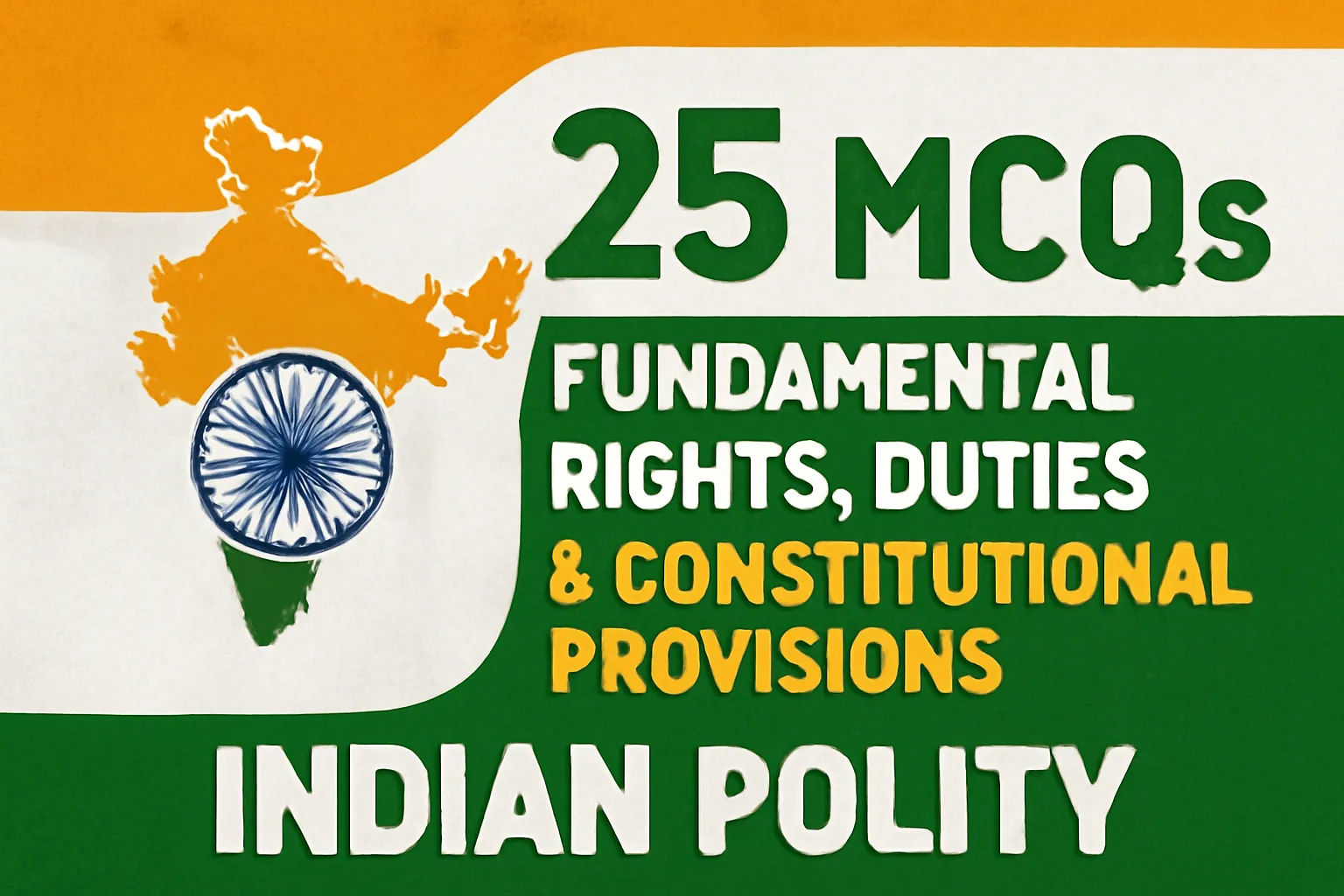
It is important to know about the Indian Constitution. If you’re preparing for different exams like JKSSB, SSC, State PSC, or different government jobs, these MCQs will help you. There are 25 multiple-choice questions. These questions cover important topics like Fundamental Rights, Directive Principles, Fundamental Duties, powers of the President. By practicing these, you can gain knowledge about the Indian Constitution.
- Which part of the Indian Constitution contains provisions related to the Fundamental Rights of citizens?
A) Part I
B) Part III
C) Part IV
D) Part V
Answer: B) Part III -
The Right to Equality is given under which Articles of the Indian Constitution?
A) 14 to 18
B) 19 to 22
C) 23 to 24
D) 25 to 28
Answer: A) 14 to 18 -
Which fundamental right gives Indian citizens, freedom to speak and express their thoughts?
A) Right to Freedom
B) Right to Equality
C) Right to Education
D) Right against Exploitation
Answer: A) Right to Freedom -
In which part of the Constitution are the Directive Principles of State Policy included?
A) Part III
B) Part IV
C) Part IX
D) Part XII
Answer: B) Part IV -
Which Article of the Constitution abolishes untouchability and forbids its practice in any form?
A) Article 15
B) Article 16
C) Article 17
D) Article 18
Answer: C) Article 17 -
Under which Article of the Constitution are the Fundamental Duties of citizens mentioned?
A) Article 50A
B) Article 51A
C) Article 52A
D) Article 53A
Answer: B) Article 51A -
Which Amendment Act of the Constitution added the Fundamental Duties to the Constitution?
A) 42nd Amendment
B) 44th Amendment
C) 52nd Amendment
D) 61st Amendment
Answer: A) 42nd Amendment -
Which Fundamental Right was removed from the list of rights by the 44th Amendment Act?
A) Right to Property
B) Right to Education
C) Right to Freedom of Religion
D) Right against Exploitation
Answer: A) Right to Property -
The Right to Education is a Fundamental Right under which Article of the Constitution?
A) Article 19A
B) Article 21A
C) Article 22A
D) Article 23A
Answer: B) Article 21A -
Which Article guarantees the freedom to form associations or unions in India?
A) Article 18
B) Article 19(1)(c)
C) Article 20
D) Article 21
Answer: B) Article 19(1)(c) -
Which Article allows the Parliament to make laws for creating new states or changing state boundaries?
A) Article 2
B) Article 3
C) Article 4
D) Article 5
Answer: B) Article 3 -
Which constitutional body conducts elections to the Parliament, State Legislatures, and offices of President and Vice-President?
A) Supreme Court
B) Election Commission of India
C) Law Commission of India
D) Comptroller and Auditor General
Answer: B) Election Commission of India -
The Rajya Sabha in India is also known by which other name?
A) Upper House of Parliament
B) House of the People
C) Legislative Assembly
D) Council of Ministers
Answer: A) Upper House of Parliament -
Powers between the Union and the States are divided by which schedule of the Constitution?
A) Sixth Schedule
B) Seventh Schedule
C) Eighth Schedule
D) Ninth Schedule
Answer: B) Seventh Schedule -
Which Article of the Constitution allows the President to proclaim a National Emergency?
A) Article 350
B) Article 352
C) Article 356
D) Article 360
Answer: B) Article 352 -
For the protection of Fundamental Rights, under which Article can a citizen approach the High Court?
A) Article 226
B) Article 227
C) Article 228
D) Article 229
Answer: A) Article 226 -
The Finance Commission in India is appointed after how many years?
A) Every 3 years
B) Every 5 years
C) Every 6 years
D) Every 10 years
Answer: B) Every 5 years -
To change the Constitution, which Article gives the power to Parliament?
A) Article 360
B) Article 368
C) Article 370
D) Article 371
Answer: B) Article 368 -
The Supreme Court of India has a Chief Justice and how many highest judges?
A) 25
B) 30
C) 33
D) 34
Answer: C) 33 -
In India, who decides and suggests how the money collected from taxes should be shared between the central government and the state governments?
A) NITI Aayog
B) Finance Commission
C) Planning Commission
D) Reserve Bank of India
Answer: B) Finance Commission -
Which Article provides for the establishment of Panchayats in rural areas?
A) Article 243
B) Article 244
C) Article 245
D) Article 246
Answer: A) Article 243 -
Which Article gives the President the power to set up a commission for backward classes?
A) Article 338
B) Article 338B
C) Article 340
D) Article 341
Answer: C) Article 340 -
Which Article empowers the Parliament to make laws on State List subjects during a national emergency?
A) Article 248
B) Article 249
C) Article 250
D) Article 251
Answer: C) Article 250 -
Which schedule of the Indian Constitution contains the list of Official Languages?
A) Sixth Schedule
B) Seventh Schedule
C) Eighth Schedule
D) Ninth Schedule
Answer: C) Eighth Schedule -
Who is called the “Guardian of the Constitution” in India due to their role in its interpretation?
A) Prime Minister
B) President of India
C) Supreme Court
D) Parliament
Answer: C) Supreme Court
Leave a Reply